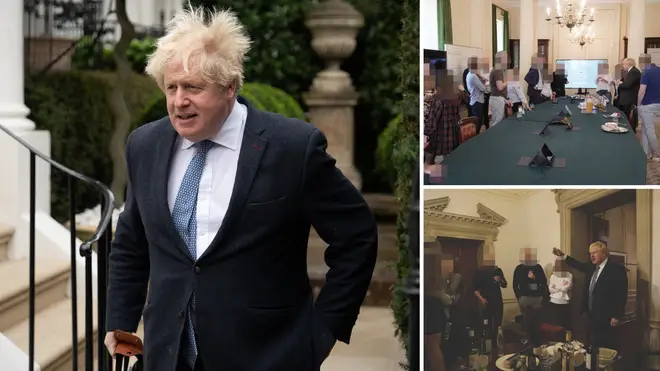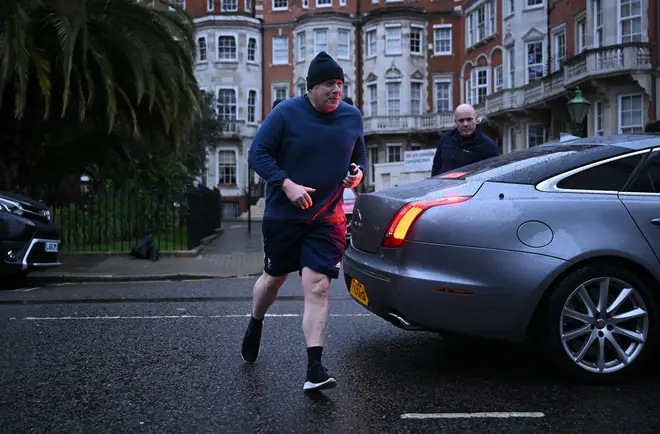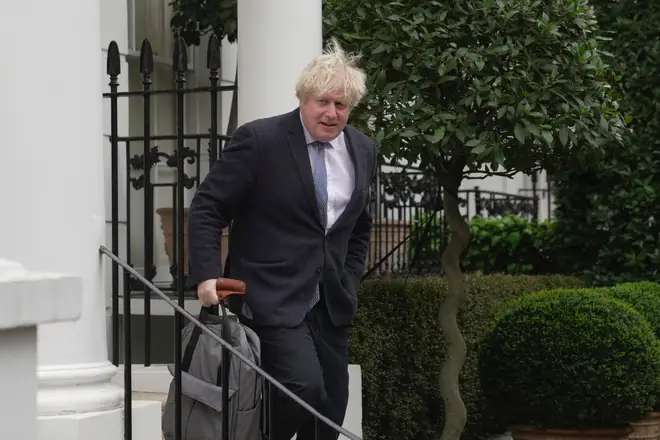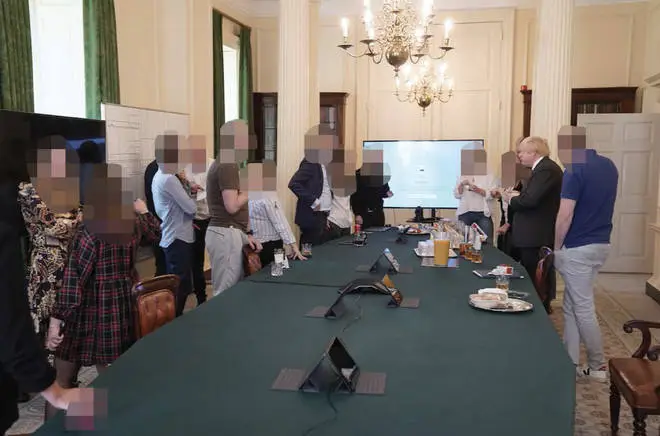
Richard Spurr 1am - 4am
22 March 2023, 09:58 | Updated: 22 March 2023, 12:05

Boris Johnson “had the opportunity to shut down" lockdown gatherings in Downing Street but didn't, a No10 official has said in Partygate evidence.
As part of a newly-released 110-page dossier into lockdown gatherings in Downing Street, evidence was submitted stating the former PM “allowed the culture to continue”.
In written evidence to the Privileges Committee by an unnamed Downing Street employee, and shared in supporting documents ahead of Mr Johnson's evidence hearing, the official said on February 7: "The former prime minister often saw and joined these gatherings, either he was invited by Spads (special advisers) or spotted them whilst walking up to his flat.
"The route he took down the corridor looks straight into the press room and vestibule so it's impossible not to see.
"He had the opportunity to shut them down but joined in, made speeches, had a drink with staff.
"He could have taken the issue up with Martin Reynolds, his principal private secretary, to shut them down.
"He could see what was happening and allowed the culture to continue."

In further evidence submitted today, former Downing Street director of communications Jack Doyle said the public "will get bored" of Partygate after Number 10 was asked to comment on lockdown-busting parties taking place.
When pressed by the media on whether "Xmas drinks" took place in Number 10 in December 2020 - when Covid restrictions were in place - Mr Doyle asked a No10 official to "pull together our best defence".
Mr Doyle went on to say "the key thing is there were never any rules against workplace drinking so we can say with confidence no rules were broken".
He continued: "Ignore the 'Xmas quiz' bulls*** - who cares. Just be robust and they'll get bored".
The former prime minister will be grilled by the Committee over claims he misled the House of Commons in relation to a series of lockdown-busting parties that took place in Number during lockdown - known as 'Partygate'.
Mr Johnson's ex-adviser Dominic Cummings also features in the new evidence dossier, telling MPs that it was "comical" that the former PM thought a garden party on May 20, 2020, was a work event.
Mr Cummings said his old boss "certainly knew it was a drinks party because I told him".
The event took place in Number 10, with staff invited by the former principal private secretary to the PM, Martin Reynolds, who told invitees to "bring your own booze!"

The former prime minister previously said he is "looking forward" to his hearing with MPs today over Partygate and claimed there is "not a shred of evidence" that he knowingly or recklessly misled parliament.
Mr Johnson accepted he misled the House of Commons with a 'half-baked' account when he said lockdown rules had been followed in No 10 - but insisted the statements were made “in good faith” in his full evidence submitted to the Privileges Committee, which was published in full today.
He said in a later statement on Tuesday evening: "‘I look forward very much to the committee session tomorrow.
"I believe that the evidence conclusively shows that I did not knowingly or recklessly mislead Parliament.
"The committee has produced not a shred of evidence to show that I have;”
Mr Johnson's evidence was first submitted yesterday, but then a new document was given to the committee just after 8am because the old one contained "a number of typos and errors", the group said.
In his written evidence, the former PM said: "So I accept that the House of Commons was misled by my statements that the Rules and Guidance had been followed completely at No 10.
"But when the statements were made, they were made in good faith and on the basis of what I honestly knew and believed at the time. I did not intentionally or recklessly mislead the House on December 1 2021, December 8 2021, or on any other date. I would never have dreamed of doing so."
Read more: Read it in full: Boris Johnson's Partygate defence revealed
He conceded in his evidence to the Privileges Committee that his statements to Parliament "did not turn out to be correct", but insisted he corrected the record at "the earliest opportunity".
He said he was "shocked" by the findings of civil servant Sue Gray, who investigated Partygate, and that he would not have told MPs what he initially said if he had been aware of that information.
"It is of course true that my statements to Parliament that the Rules and Guidance had been followed at all times did not turn out to be correct, and I take this opportunity to apologise to the House for that," he said.

"As soon as the Sue Gray investigation and the Metropolitan Police investigation had been concluded, I corrected the record. I believed - and I still believe - that this was the earliest opportunity at which I could make the necessary correction.
"It was not fair or appropriate to give a half-baked account, before the facts had been fully and properly established, including into many events about which I had no personal knowledge."
But he said "there is no evidence at all that supports an allegation that I intentionally or recklessly misled the House".
"There is not a single document that indicates that I received any warning or advice that any event broke or may have broken the Rules or Guidance."
He added the Committee "appears to be mounting a case that, despite the absence of any evidence of warnings or advice, it should have been 'obvious' to me that the Rules and Guidance were not being followed, because of the gatherings that I attended.

"It is important to be frank: this amounts to an allegation that I deliberately lied to Parliament."
He said this allegation extended to "many others" who attended the same gatherings, but that most had given evidence indicating they did not consider their attendance against the rules.
He told the committee it would be "illogical" to claim what happened was a cover-up, saying that some who attended the Partygate events "wished me ill" and he would have known any attempt to deceive people about them would instead result in "instant exposure".
He pointed to the presence of the official No10 photographer, saying he would not have been present if Mr Johnson had known the events were "obviously" against the rules, and denied it was reckless to rely on advisers to assure him about the events.
Mr Johnson also claimed the lack of social distancing in No10 - which he branded an "old, cramped London townhouse" - was not necessarily a breach of guidance, with "proximity" sometimes becoming "unavoidable".
The former PM defended his attendance at leaving parties as him "rais[ing] a glass to honour a colleague, but that was it", saying it was his "duty" as PM to say some words. He also took aim at his Covid fine from police over a gathering in the Cabinet Room for his birthday.
"I have accepted the conclusion of the police that my participation in the gathering in the Cabinet Room on my birthday, which I knew nothing about in advance, was unlawful.
"However, to this day it remains unclear to me - and I believe the Prime Minister may feel the same - how precisely we committed an offence under the regulations.
"I have never been provided with any rationale by the police, in particular how some individuals that attended did not receive a fixed penalty notice.
"We had a sandwich lunch together and they wished me happy birthday. I was not told in advance that this would happen. No cake was eaten, and no-one even sang happy birthday. The primary topic of conversation was the response to Covid-19."
He said he wished he had considered how events like the May 20 gathering in the No10 garden could be perceived, but again insisted no-one at the time said there were "any concerns" about compliance with Covid rules, nor had he seen emails inviting staff to bring their own booze, as emerged in Ms Gray's inquiry.
He also referred to one event as a "party" during a WhatsApp conversation with an aide, in which he said he wanted to get the "truth" out about it, but later said he was using shorthand as the media was describing events as parties.
Mr Johnson is due to face MPs on the committee on Wednesday.
He has access to some £220,000 of taxpayers' money to fight his case, it is estimated. His friends say he will be "vindicated".
But if MPs find he did mislead the Commons, they will need to consider if it was "reckless or intentional" and met the threshold for contempt of Parliament.
If that is accepted, he could face a punishment to be decided by the Commons, which could include a lengthy suspension that might even trigger a by-election in his Uxbridge seat.